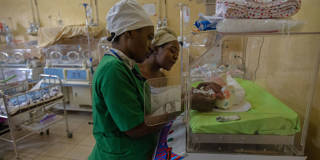The world has made great strides in providing children with access to vaccines, saving more than 150 million lives. But the international community must continue to reduce infant mortality in the developing world by ensuring that safe and effective antibiotics are available for pediatric use.
CAPE TOWN – Over the last half-century, the number of children who die before reaching the age of five has fallen dramatically, from around 20 million in 1960 to 4.9 million in 2022, largely owing to the Expanded Programme on Immunization (EPI). Established by the World Health Organization in 1974, the EPI has been extraordinarily successful in providing the youngest people with access to vaccines, saving more than 150 million lives. But while such progress is worthy of celebration, there is still much work to do, because newborns comprise half of all deaths in children under five each year, many of which are caused by infection.

CAPE TOWN – Over the last half-century, the number of children who die before reaching the age of five has fallen dramatically, from around 20 million in 1960 to 4.9 million in 2022, largely owing to the Expanded Programme on Immunization (EPI). Established by the World Health Organization in 1974, the EPI has been extraordinarily successful in providing the youngest people with access to vaccines, saving more than 150 million lives. But while such progress is worthy of celebration, there is still much work to do, because newborns comprise half of all deaths in children under five each year, many of which are caused by infection.